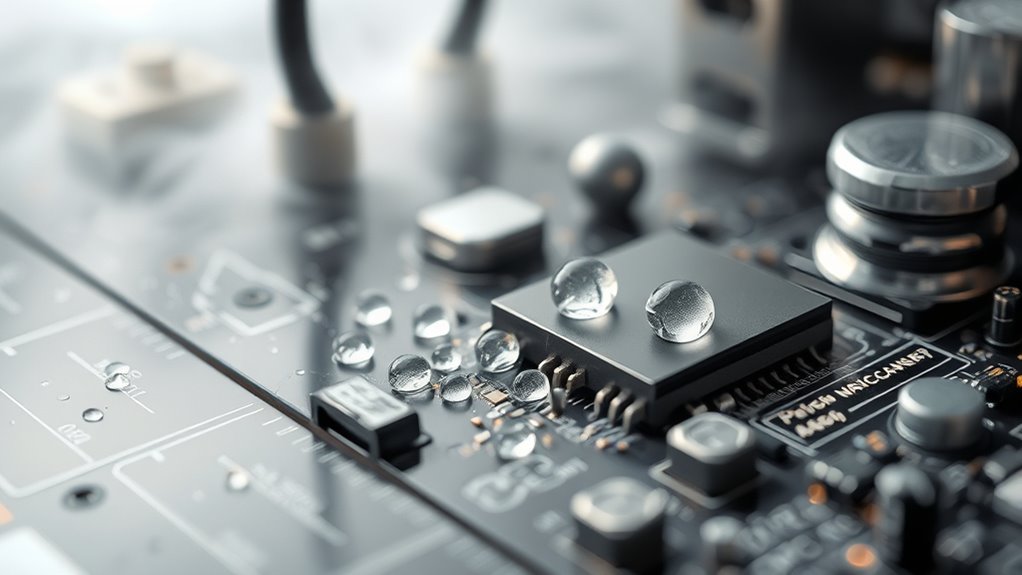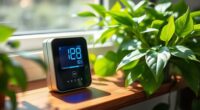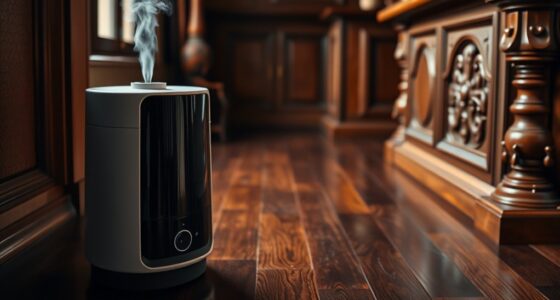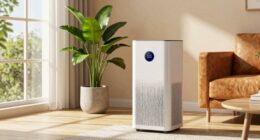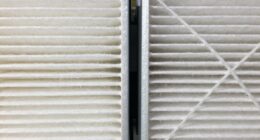Humidity can harm your electronics by causing corrosion in metal parts, which weakens connections and increases the risk of short circuits. Moisture can also lead to foggy screens and device failure over time. To protect your devices, keep them in dry environments, use moisture barriers like coatings and sealed enclosures, and control ambient humidity with dehumidifiers. Continuing will reveal more effective ways to keep your electronics safe from humidity damage.
Key Takeaways
- Moisture causes corrosion in metal parts, leading to weakened connections and increased risk of electrical failures.
- Applying protective coatings and moisture barriers prevents water vapor ingress and shields sensitive components.
- Controlling ambient humidity with dehumidifiers and proper storage reduces moisture exposure and device degradation.
- Regular inspections for signs of moisture, such as foggy screens or corrosion, enable early detection and intervention.
- Maintaining low humidity environments and using protective measures extend the lifespan and reliability of electronic devices.
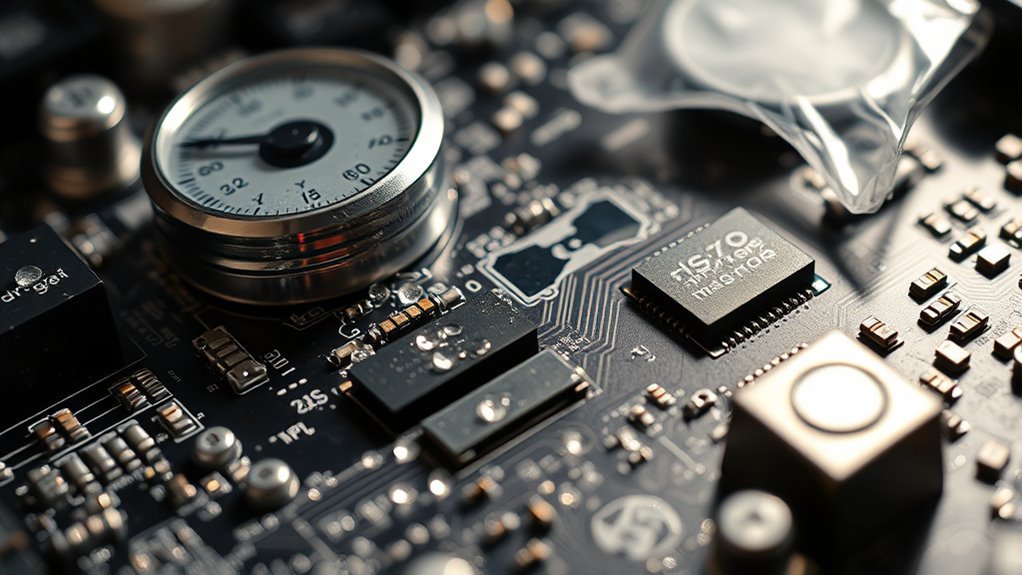
Humidity levels can markedly impact the performance and longevity of electronic devices. When the air is humid, moisture can seep into your gadgets, leading to a range of problems that can compromise their function. One of the primary concerns is corrosion, which occurs when moisture interacts with metal components inside your devices. Over time, this corrosion can weaken connections, cause short circuits, and ultimately lead to device failure. To combat this, corrosion prevention becomes essential. Using protective coatings or conformal coatings on circuit boards creates a barrier that shields sensitive components from moisture, substantially reducing the risk of corrosion. Additionally, ensuring proper storage and handling of electronics in controlled environments can help maintain low humidity levels, further protecting your devices.
Another effective strategy to safeguard electronics from humidity damage is the use of moisture barriers. These barriers act as physical shields that prevent water vapor from reaching critical parts of your devices. Moisture barriers can be as simple as sealed enclosures or specialized coatings designed to block moisture transmission. When installing or repairing electronic equipment, consider employing moisture barriers around vulnerable areas, especially if the device will operate in high-humidity environments. This prevents condensation from forming inside the device, which can be just as damaging as direct water exposure. furthermore, moisture barriers can help maintain consistent internal conditions, ensuring that temperature and humidity levels stay within safe ranges, thereby prolonging the lifespan of your electronics.
It’s also wise to incorporate humidity control measures into your environment. Using dehumidifiers in storage or work areas can keep humidity levels in check, reducing the chances of moisture-related issues. Regularly inspecting your devices for signs of moisture buildup, such as corrosion or foggy screens, allows you to catch problems early. If you notice any, drying out your devices and reapplying protective coatings or moisture barriers can prevent further damage. Remember, protecting electronics from humidity isn’t just about preventing immediate malfunctions; it’s also about preserving their long-term reliability and performance.
Frequently Asked Questions
Can Low Humidity Damage Electronic Devices?
Low humidity can indeed harm your electronic devices by causing static electricity buildup. This static can lead to damage or malfunction over time. To prevent this, you should focus on humidity control in your environment, maintaining the right moisture levels. Moisture prevention becomes essential, especially in dry conditions, so using humidifiers or anti-static mats helps protect your devices from static discharge and potential damage.
Does Humidity Impact Battery Life?
Humidity can impact your battery life by causing moisture absorption inside the device. Excess moisture accelerates battery degradation, leading to reduced capacity over time. When humidity levels are high, it increases the risk of corrosion and internal damage, which shortens battery lifespan. To protect your electronics, keep devices in dry environments and avoid exposing batteries to humid conditions. Proper storage and handling help maintain ideal battery performance and longevity.
Are Certain Electronic Components More Sensitive to Humidity?
Certain electronic components are more sensitive to humidity, especially humidity-sensitive components like microchips and circuit boards. You can protect them by applying moisture-resistant coatings that prevent moisture buildup. These coatings act as a barrier, reducing the risk of corrosion and short circuits. Knowing which components are most vulnerable helps you take targeted precautions, ensuring your electronics stay safe and functional even in high humidity environments.
How Quickly Can Humidity Cause Corrosion?
Did you know corrosion can start within just a few hours of moisture exposure? Humidity’s corrosion speed depends on factors like temperature and surface materials, with moisture penetration causing rapid deterioration. Once moisture infiltrates, corrosion can develop in as little as 24 to 48 hours, especially in high humidity environments. To prevent this, you must limit moisture contact and guarantee proper sealing of sensitive electronic components.
Can Humidity Fluctuations Affect Data Storage?
Humidity fluctuations can indeed impact data storage. When humidity levels rise suddenly, humidity-induced condensation can form inside devices, leading to moisture-related corrosion of sensitive components. This corrosion can damage storage drives and corrupt data. To prevent this, you should keep storage environments stable, use dehumidifiers, and ensure proper sealing of equipment. These steps help reduce the risk of moisture-related issues and safeguard your valuable data against humidity-induced damage.
Conclusion
Remember, humidity is like a silent thief that can quietly damage your electronics if you’re not careful. By keeping your devices dry and protected, you shield them from corrosion and malfunctions—like armor guarding a treasure. Don’t let moisture sneak in and steal your technology’s lifespan. Stay vigilant, use proper safeguards, and treat humidity as your silent adversary. Because in the battle against moisture, prevention is your best weapon—keep your electronics safe and sound!
